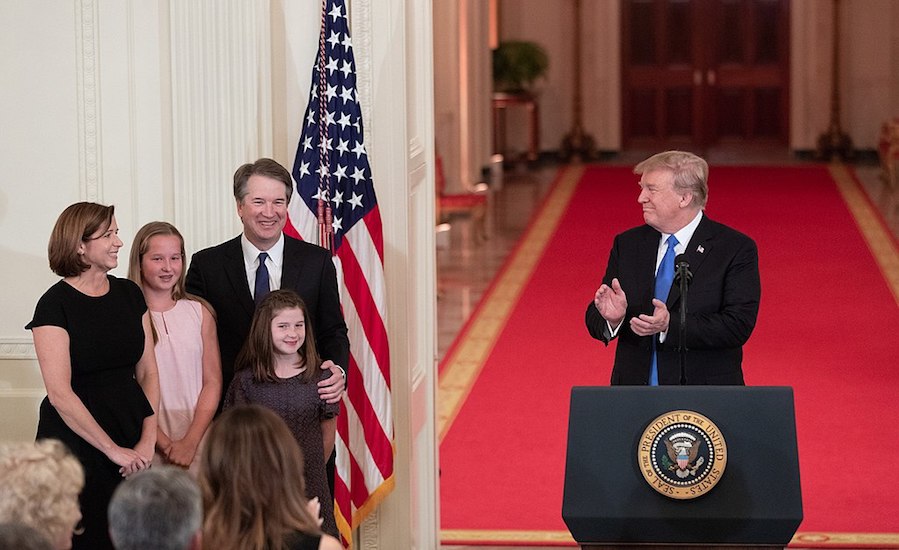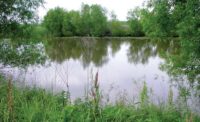As construction industry officials pore over the many rulings authored by federal appellate Judge Brett M. Kavanaugh, President Trump's nominee to replace retiring Justice Anthony Kennedy on the U.S. Supreme Court, they see a philosophy that relies on, and does not go beyond, the text of federal statutes and regulations.
Kavanaugh, whose nomination Trump announced on July 9, has been on the U.S. Court of Appeals for the District of Columbia Circuit since 2006. He has drawn strong support from many congressional Republicans, including Senate Majority Leader Mitch McConnell (Ky.), who referred to the nominee as an "all-star."
But opponents, including many congressional Democrats, environmental groups and organized labor, have launched a push to try to block Kavanaugh's approval by the Senate.
If there are no defections, however, among the 50 GOP senators who are expected to vote on the nominee, he would squeak through to confirmation without needing any Democratic votes.
If Kavanaugh is confirmed before the high court begins its new term in October, one case he would face has strong implications for construction. That case, Weyerhaeuser v. U.S. Fish and Wildlife Service, centers on the scope of the Endangered Species Act. The court has scheduled oral arguments in that case for Oct. 1, the first day of its term. [View appeals court's ruling in the case here.]
Overall, says Larry Liebesman, a senior adviser with water-resources consulting firm Dawson & Associates, "From what I can tell and any opinions I've read, he's clearly a strict constructionist."
Nick Goldstein, American Road & Transportation Builders Association vice president for legal and regulatory issues, concurs. Goldstein says, "Judge Kavanaugh is somebody that will … be guided by the text of the legislation or the regulation in question."
He adds, "If a regulation or piece of legislation doesn't tell an agency that they have the authority to do what they're doing, he's not going to give it to them. He's not going to read beyond that."
Goldstein says, "For the regulated community, that's a good thing because it lets us know what the limits are. It lets us know where the boundaries are. It's not that you don't want to be regulated, but you do want to know the rules of the game, so to speak."
Davis-Bacon Decision
Ben Brubeck, Associated Builders and Contractors vice president for regulatory, labor and state affairs, said in an emailed statement, "Judge Kavanaugh's decisions on a number of important cases impacting the construction industry have blocked bureaucratic overreach and stopped attempts by federal agencies to circumvent congressional intent."
Brubeck points to Kavanaugh's April 2016 appellate court opinion in District of Columbia CCDC LLC v Metropolitan Regional Council of Carpenters. Writing for a unanimous three-judge panel, Kavanaugh said that, contrary to a Labor Dept. Wage and Hour Division finding, the Davis-Bacon act didn't apply to construction contracts for a major mixed-use project in Washington, D.C.
Brubeck said, "This decision saved the District an estimated $20 million in back pay and reaffirmed that privately funded projects should not be beholden to Davis-Bacon requirements."
If Kavanaugh is confirmed, Liebesman, a former trial attorney in the Justice Dept.'s environment and natural resources division, adds, "He's going to be in the mold of a [former Justice Antonin] Scalia and perhaps a [Chief Justice John] Roberts in terms of looking at the literal language of a statute and not trying to 'legislate from the bench,' as he said."
But Liebesman doesn't think Kavanaugh will automatically issue decisions that strike down federal environmental regulations. Liebesman says, "If he feels that an agency has a statutory authority that's granted in the plain meaning of the law, and it's being implemented properly, I think he would tend to defer to the agency."
Unions, 'Greens' Oppose Nominee
The AFL-CIO strongly opposes Kavanaugh's nomination. The federation's president, Richard Trumka, said in a statement, "Judge Kavanaugh routinely rules against working families, regularly rejects employees' right to receive employer-provided health care, too often sides with employers in denying employees relief from discrimination in the workplace and promotes overturning well-established U.S. Supreme Court precedent."
Environmentalists are gearing up to campaign against Kavanaugh's confirmation. Tiernan Sittenfeld, League of Conservation Voters senior vice president for government affairs, told reporters in a July 11 conference call that the nominee "has consistently come down on the side of big polluters at the expense of the public interest."
As an example, Sittenfeld cited Kavanaugh's 2012 opinion in EME Homer City Generation LP v. EPA, which invalided the agency's rule governing air emissions of sulfur dioxide and nitrogen oxides that cross state boundaries.
Kavanaugh wrote, "Absent a claim of constitutional authority (and there is none here), executive agencies may exercise only the authority conferred by statute and agencies may not transgress statutory limits on that authority."
Endangered Species Case
If Kavanaugh does win a Supreme Court seat, construction officials and environmental advocates will be watching what questions he asks in the oral-argument session on the Weyerhaeuser case, which Liebesman sees as one of the most important Supreme Court cases dealing with the Endangered Species Act in more than a decade.
More specifically, it deals with a Fish and Wildlife action requiring that a tract of privately owned land in Louisiana be set aside as habitat for the endangered dusky gopher frog—although the frog isn't currently living in that parcel of land.
According to the federal appeals court ruling in the case, the tract's owners, which include Weyerhaeuser, "intend to use the land for residential and commercial development and timber operations."





Post a comment to this article
Report Abusive Comment